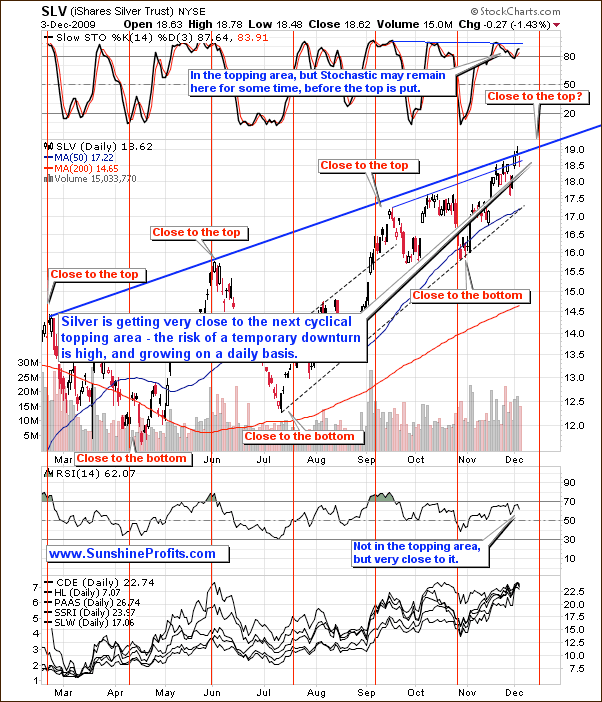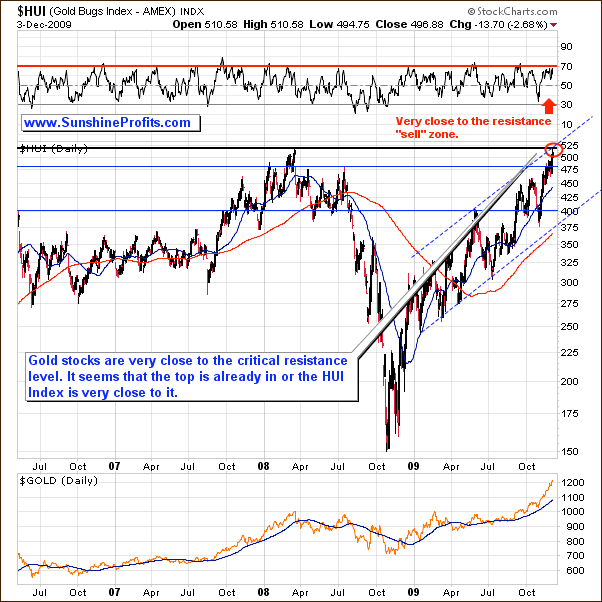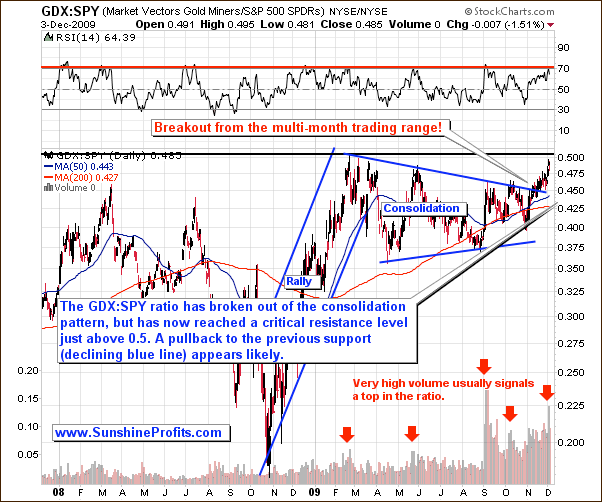Have Gold and Silver Topped?, Precious Metals Stocks Provide Important Clues
Commodities / Gold & Silver 2009 Dec 04, 2009 - 04:11 PM GMT The precious metals market is declining just as I mentioned in the previous essay, but before I proceed with providing you with my thoughts on the current situation, I would like to put this analysis into proper perspective.
The precious metals market is declining just as I mentioned in the previous essay, but before I proceed with providing you with my thoughts on the current situation, I would like to put this analysis into proper perspective.
I’m in London this week and the city is vibrant. Rubbing elbows in Piccadilly Circus with the crowds rushing to catch the latest West End show, you hardly feel that there is a global economic crisis. Londoners seemed to have shrugged off the Dubai crises, as did the rest of the world. They seem to be happily unaware, or else they are ignoring, the fact that Britain’s government debt is on the rise and is expected to be more than 80 percent of the nation’s economic output next year.
It does make you wonder.
Dubai went from boomtown to doomtown in very short order. This one-time desert wonderland with palm-shaped islands, extravagant architecture and indoor ski slope, is now strapped to pay its bills.
Is this an isolated event or is it an omen of more debt bombs waiting to explode? Will governments, gorged on debts, be able to shoulder their obligations?
The New York Times reported this week that bills for an “unprecedented borrowing binge” by nations around the globe are starting to fall due. “The numbers are startling,” said the New York Times. Germany’s debt outstanding is expected to increase to the equivalent of 77 percent of the nation’s economic output next year. Ireland and Baltic countries are in even worse shape, with Ireland’s public debt expected to soar to 83 percent of gross domestic product next year.
Governments have taken on increasingly short-term debt, which will be coming due soon. They plan to “roll over” the loans extending the debt as long as there are creditors willing to buy short term paper. In the U.S., for example, treasury bills maturing within one year have risen from around 33 percent of total debt two years ago, to around 44 percent this year, according to the New York Times.
Within the next year, the U.S. Treasury will have to refinance $2 trillion in short-term debt. If you add deficit spending to that, estimated at $1.5 trillion, and pretty soon you’re talking about a whole bunch of money.
Most economists don’t believe that in the near future we will see nations defaulting on their government debts. They say that it’s likely that rich nations and the International Monetary Fund would intervene with a bailout.
What does a country need to do in order to insure that it does not go bankrupt?
There is what economists call The Allan Greenspan and Pablo Guidotti rule, named for the former chairman of the Federal Reserve and former Argentinean deputy minister of finance. The rule, presented in 1999 in a G-33 seminar and in a speech at the World Bank, states that a country should maintain enough hard currency reserves equal to 100 percent of it s short-term (one year) foreign debt. In other words, countries should have enough reserves to resist a massive withdrawal of short-term foreign capital from their shores.
So how does America stack up? Does it have enough hard currency to back up a year’s worth of foreign debt?
The U.S. is the world’s largest holder of gold with 8,133.5 metric tones. At today’s prices that is a little over $300 billion. That’s not enough. If you throw in America’s petroleum reserves and its foreign currency holdings, that still won’t cover $2 trillions worth of debt that will mature in the next 12 months. Who will want to buy U.S. Treasury paper? India has already voted in favor of gold when it bought 200 tons of IMF gold last month.
In any case, we will be glad that we got into gold when we did, and even more glad that we got into silver. Moving on to the technical side of the market, this week, I will provide you with the analysis of the white metal, followed by comments on the current situation in the precious metals stocks.

The chart of silver is much clearer than the one featuring gold, as there has lately been no parabolic upswing in the white metal. Instead, we see that silver is getting very close to the next cyclical topping area (marked with red vertical lines). This, accompanied by the fact that silver is very reluctant to move above the thick blue resistance line creates a very high probability that silver will not move above its March 2008 high before the correction, and possibly not even above the July 2008 high.
Given the very high level of correlation between gold, silver, and PM stocks (after all, miner's profits depend on the prices of metals), the tops on these markets are likely to be formed either at the same time or at least close to each other.
Please take a look at the HUI Index chart for more details regarding timing.

The precious metals stocks have been moving higher very rapidly in the past weeks, but they are now reaching a super-strong resistance level - their 2008 high. The strength of the resistance level is even bigger because the HUI Index is also reaching the upper border of the trading channel, and the RSI indicator is very close to the "sell" zone.
Based on the historical performance, technical analysis, and my own experience, it is likely that this rally will be stopped at least very temporarily, before gold- and silver stocks are ready to move significantly higher. More clues come from the analysis of the GDX:SPY ratio, which features the way PM stocks have been outperforming the general stocks market.

The ratio has finally broken out of the consolidation pattern, but has now reached a critical resistance level just above 0.5. Therefore, we might expect some kind of consolidation. Since the breakout has been verified in a rather insignificant way, the ratio may once again move to the 0.45 level before heading north once again.
The analysis of volume confirms this. In the past the GDX:SPY ratio topped on a relatively high volume, and this is also what we have just seen. Moreover, the RSI indicator is at the level that marked a top in the past, so the odds of a sell-off from here are even higher.
The top in the above ratio is very likely to correspond to top in the PM stocks, and also to the top in the metals.
Summing up, the fundamental outlook remains positive for the precious metals market, and consequently, their prices are likely to rise on the long run. However, there are many factors pointing to a correction in the short term. The gold market is currently very hard to analyze because of the parabolic shape of the rise, but virtually all other markets suggest that a correction is either possible, or even very likely. Subscribe today for the full version of this essay, which includes much more detailed analysis, many additional charts, and rankings of top gold/silver juniors.
To make sure that you are notified once the new features (like the newly introduced Free Charts section) are implemented, and get immediate access to my free thoughts on the market, including information not available publicly, I urge you to sign up for my free e-mail list. Sign up today and you'll also get free, 7-day access to the Premium Sections on my website, including valuable tools and charts dedicated to serious PM Investors and Speculators. It's free and you may unsubscribe at any time.
Thank you for reading. Have a happy Thanksgiving holiday weekend and a profitable week!
P. Radomski
Editor
Sunshine Profits
Interested in increasing your profits in the PM sector? Want to know which stocks to buy? Would you like to improve your risk/reward ratio?
Sunshine Profits provides professional support for precious metals Investors and Traders.
Apart from weekly Premium Updates and quick Market Alerts, members of the Sunshine Profits’ Premium Service gain access to Charts, Tools and Key Principles sections. Click the following link to find out how many benefits this means to you. Naturally, you may browse the sample version and easily sing-up for a free trial to see if the Premium Service meets your expectations.
All essays, research and information found above represent analyses and opinions of Mr. Radomski and Sunshine Profits' associates only. As such, it may prove wrong and be a subject to change without notice. Opinions and analyses were based on data available to authors of respective essays at the time of writing. Although the information provided above is based on careful research and sources that are believed to be accurate, Mr. Radomski and his associates do not guarantee the accuracy or thoroughness of the data or information reported. The opinions published above belong to Mr. Radomski or respective associates and are neither an offer nor a recommendation to purchase or sell securities. Mr. Radomski is not a Registered Securities Advisor. Mr. Radomski does not recommend services, products, business or investment in any company mentioned in any of his essays or reports. Materials published above have been prepared for your private use and their sole purpose is to educate readers about various investments.
By reading Mr. Radomski's essays or reports you fully agree that he will not be held responsible or liable for any decisions you make regarding any information provided in these essays or reports. Investing, trading and speculation in any financial markets may involve high risk of loss. We strongly advise that you consult a certified investment advisor and we encourage you to do your own research before making any investment decision. Mr. Radomski, Sunshine Profits' employees and affiliates as well as members of their families may have a short or long position in any securities, including those mentioned in any of the reports or essays, and may make additional purchases and/or sales of those securities without notice.
Przemyslaw RadomskiArchive |
© 2005-2022 http://www.MarketOracle.co.uk - The Market Oracle is a FREE Daily Financial Markets Analysis & Forecasting online publication.



